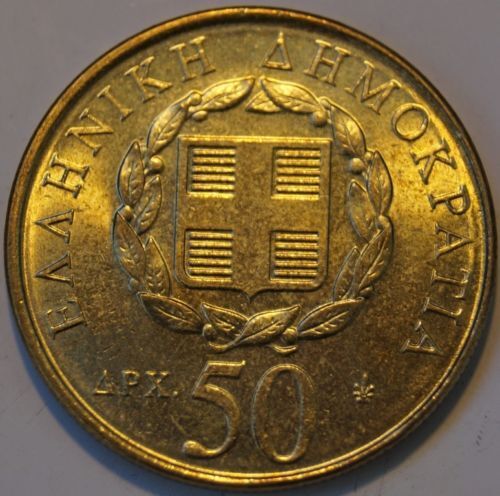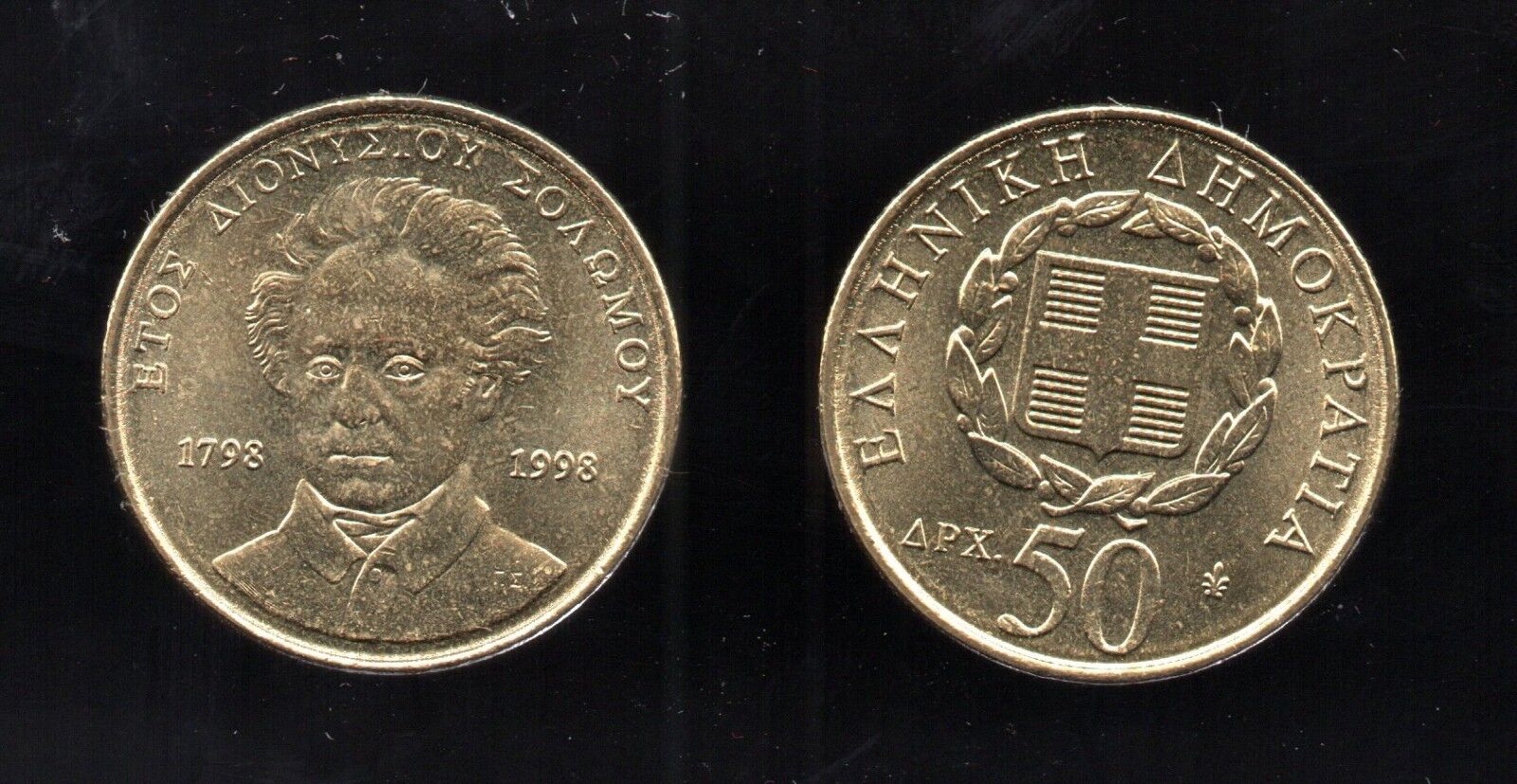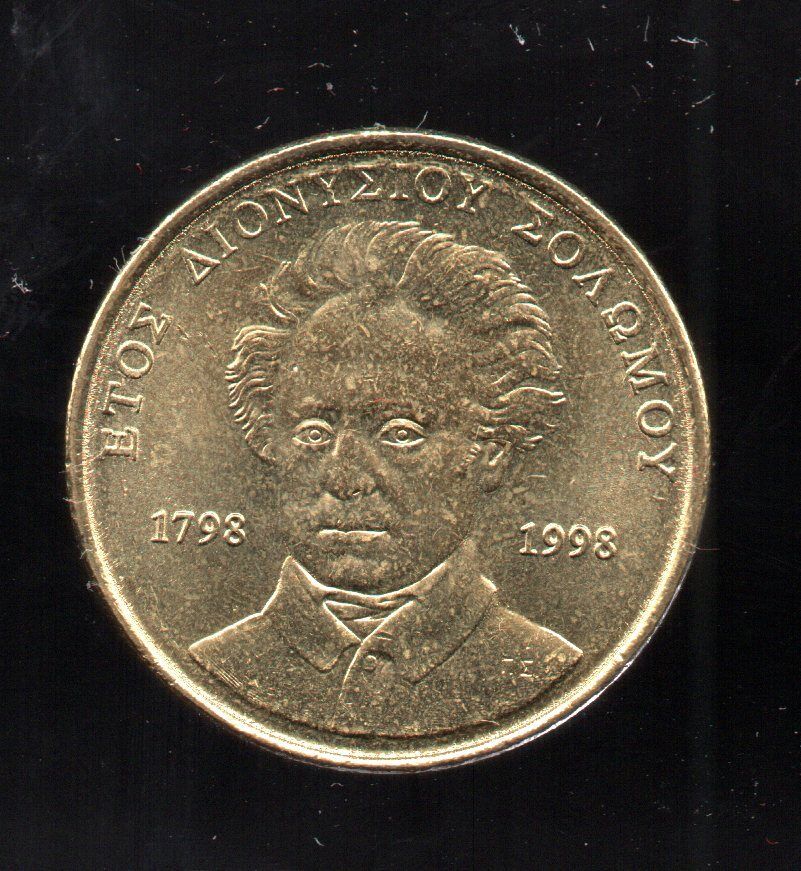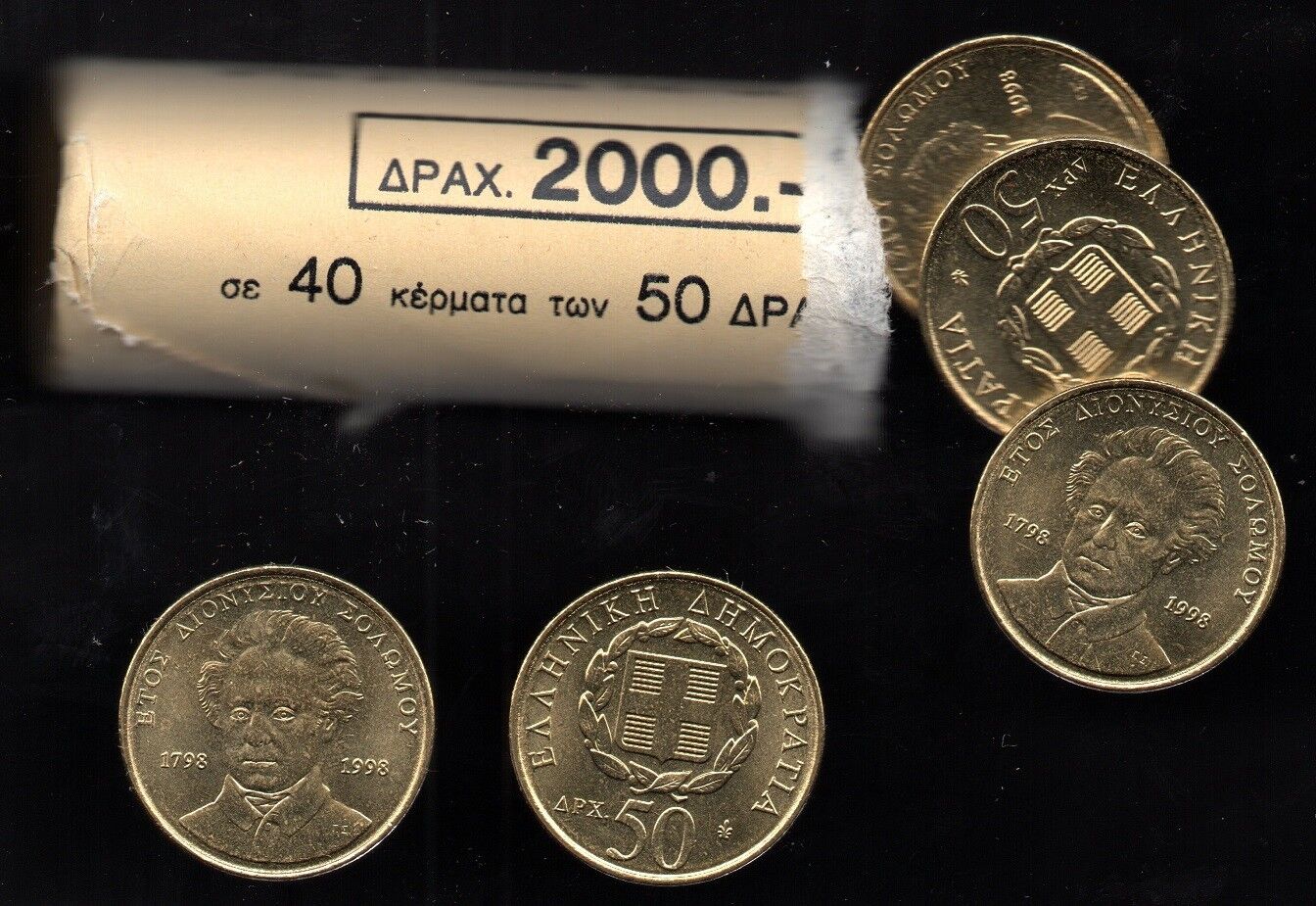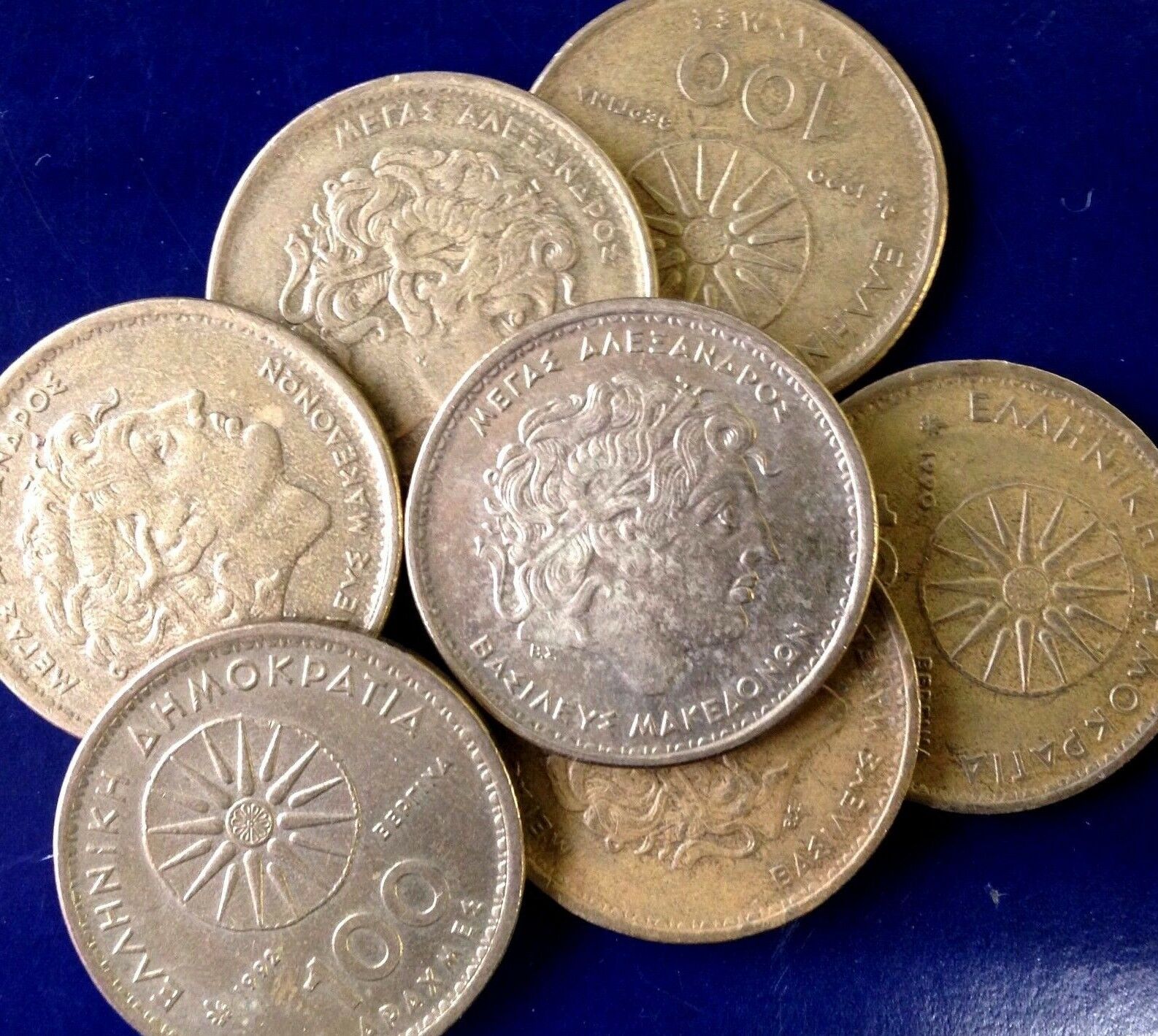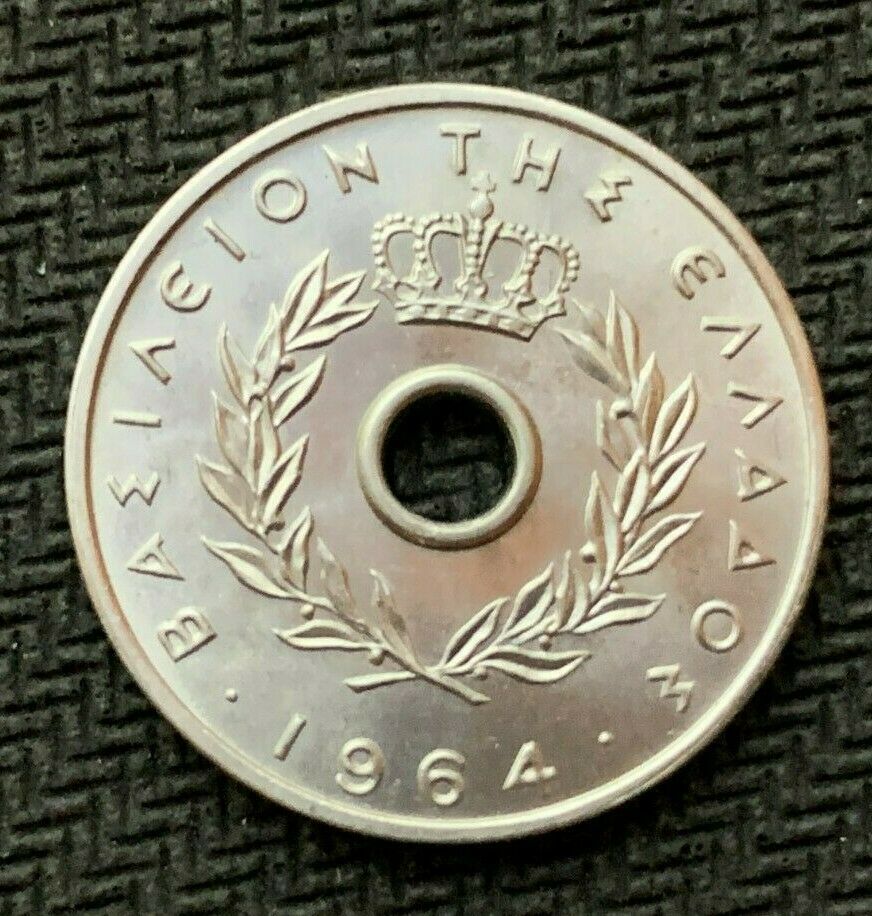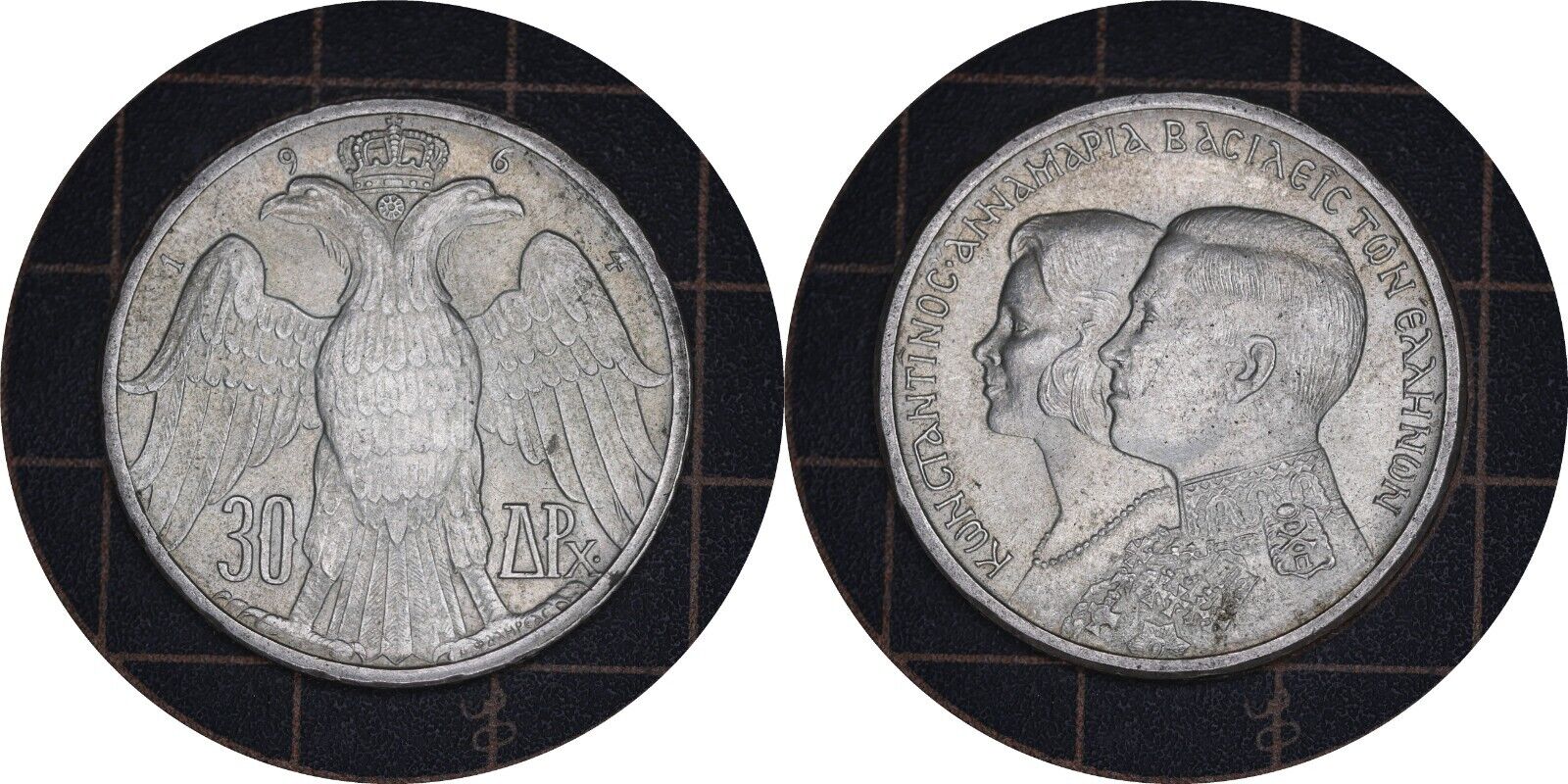-40%
Greece. 50 drachmas UNC 1998, Year Dionysios Solomos, Greek Coin, BANK OF GREECE
$ 2.05
- Description
- Size Guide
Description
***** O F F E R *****GREECE.
50
DRACHMAI
YEAR :
1998
Year : Dionisiou Solomou & Riga Ferraiou
BANK OF GREECE
Mintage :
75.000.000
GREEK COIN [
KM#: 172
]
,
Diameter (mm):
27.5
Thickness (mm):
2.25 (+/- 0.01)
Weight (g):
9.00
Composition:
92% copper - 6% aluminium - 2% nickel
Shape:
Round
Edge:
Milled
Engraver:
Kazakos
[
Greek Democracy
]
It is the Commemorative coin
:
Year DIONISIOY SOLOMOY
GREEK PARLIAMENT,
1798 - 1998
200 Years from Birth.
Description:
200 years Dionisios Solomos 1798-1998 Dionisios Solomos encouraged the nation emerging from Turkish bondage and his fine Hymn to Liberty (1823), written at the age of 25, became the national anthem of Greece. He was born in Zakinthos in 1978, which, by a quirk of history, was at that time a British Protectorate. His father, Count Salomon, was English and Solomos himself held a British Passport.
Dionysios Solomos (
Greek
:
Διονύσιος Σολωμός
, 8 April 1798 - 9 February 1857) was a
Gree
k
poet
from
Zakynthos
. He is best known for writing the
Hymn to Liberty
(
Greek
:
Ὕμνος εἰς τὴν Ἐλευθερίαν
,
Ýmnos eis tīn Eleutherían
), of which the first two
stanzas
, set to music by
Nikolaos Mantzaros
, became the Greek
national anthe
m in 1865. He was the central figure of the
Heptanese Schoo
l of poetry, and is considered the national poet of Greece - not only because he wrote the national anthem, but also because he contributed to the preservation of earlier poetic tradition and highlighted its usefulness to
modern literature
. Other notable poems include
Ὁ Κρητικός
(
Τhe Cretan
),
Ἐλεύθεροι Πολιορκημένοι
(
The Free Besieged
) and others. A characteristic of his work is that no poem except the
Hymn to Liberty
was completed, and almost nothing was published during his lifetime.
Early life and education
Born in 1798, Dionysios Solomos was the illegitimate child of a wealthy
count
, Nikolaos Solomos, and his housekeeper, Angeliki Nikli. Nikolaos Solomos was of Cretan origin; his family were Cretan refugees who settled on Zakynthos in 1670 after
Crete
's conquest by the
Ottoman Empir
e in 1669. The Italian version of the family name is recorded as: Salamon, Salomon, Solomon, and Salomone. It is possible that his mother Angeliki Nikli came from the region of
Mani
. Count Nikolaos Solomos was legally married to Marnetta Kakni, who died in 1802. From that marriage, he had two children: Roberto and Elena. Since 1796, Nikolaos Solomos had a parallel relationship with his housekeeper Angeliki Nikli, who gave birth to one more son apart from Dionysios, Dimitrios (born in 1801). His father married Dionysios' mother a day before he died on 27 February 1807, making the young Dionysios legitimate and a co-heir to the count's estate, along with his half-brother. The poet spent his childhood years on Zakynthos until 1808, under the supervision of his Italian tutor, abbot Santo Rossi. After his father's death, count Dionysios Messalas gained Solomos' custody, whereas his mother married Manolis Leontarakis in 15 August 1807. In 1808, Messalas sent Solomos to
Ital
y in order to study
law
, as was customary with Ionian nobility, but possibly also because of Dionysios' mother's new marriage.
Studies in Italy
Solomos went to Italy with his tutor, who returned to his home town,
Cremona
. Initially he was enrolled at the Lyceum of St. Catherine in
Venice
, but he had adjustment difficulties because of the school's strict discipline. For that reason, Rossi took Solomos with him to
Cremona
, where he finished his high-school studies in 1815. In November 1815, Solomos was enrolled at
Pavia's
University's Faculty of Law, from which he graduated in 1817. Given the interest the young poet showed in the flourishing
Italian literature
and being a perfect speaker of Italian, he started writing poems in Italian. One of the most important first poems written in Italian during that period of time was the
Ode per la prima messa
(Ode to the first mass) and
La distruzione di Gerusalemme
(The destruction of Jerusalem). In the meantime, he acquainted himself with famous Italian poets and novelists (possibly
Manzoni
,
Vincenzo Monti
etc.);
Ugo Foscolo
from Zakynthos was among his friends. As a result, he was easily accepted in the Italian literary circles and evolved into a revered poet of the Italian language.
Return to Zakynthos
After 10 years of studies Solomos returned to Zakynthos in 1818 with a solid background in
literature
. On Zakynthos, which at that time was well-known for its flourishing literary culture, the poet acquainted himself with people interested in literature.
Antonios Matesis
(the author of
Vasilikos
),
Georgios Tertsetis
,
Dionysios Tagiapieras
(a physician and supporter of the
dimotiki
, and also a friend of
Ioannis Vilaras
) and
Nikolaos Lountzi
s were some of Solomos' most well-known friends. They used to gather in each other's homes and amused themselves by making up poems. They frequently satirized a Zakynthian doctor, Roidis (Solomos' satirical poems referring to the doctor are
The doctors' council
, the
New Year's Day
and
The Gallows
). They also liked to improvise poems on a given rhyme and topic. His improvised Italian poems during that period of time were published in 1822, under the title
Rime Improvvisate
.
================================
GUARANTEED AUTHENTIC.
Condition:
The coins characterized :
UNC
See the scan (pictures), shape your own opinion
You will take that you see in photographs of sale.
The
price is for
each coin.
================================
Payment instructions
·
Paypal prefered. Sign up for
PayPal
; the fast, easy, and secure way to pay online.
·
For any questions about payment and shipping instruction please don't hesitate to be in contact with me
·
Payment must be sent in 1 - 7 days of the end of sale
Shipping Instructions and Cost
·
Items will shipped in the next 1 - 5 days after receiving the payment
·
Items
shipped WORLDWIDE with
Standard (Regular) letter :
3.50$
(at your own risk)
·
Items
shipped WORLDWIDE with
Registered letter : 6.00
$
·
Items
with total value more than 30.00$ shipped only with Registered letter :
6.00
$
·
Please don't ask unregistered
shipping for total value
>
30.00$
.
·
The shipping cost for each additional COIN won is :
+0.50$
.
·
Shipping Insurance can be added for some countries but not USA.
·
At the end of your purchases, please ask me for invoice.
·
Please don't send individual payments for each item
.
·
Day of receiving depends from Countrie's Distance (2-15 working days).
If you don't receive between this time the item please inform me imediately.

